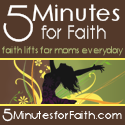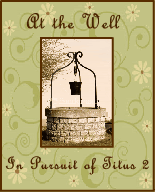
While enjoying the Ultimate Blog Party I came across DeeDee's, I Have No Greater Joy Blog. Weekly she hosts a gathering place for us to share "nuggets" from God's Word. What a joy to teach each other and hear the Word. Today I felt led to join in. If you'd like to see her post or others simply click on the button above!
My nugget:
My reading today was in Deuteronomy, and while there I found this.
"When he sits on the throne as king, he must copy these laws on a scroll for himself in the presence of the Levitical priests. He must always keep this copy of the law with him and read it daily as long as he lives. That way he will learn to fear the LORD his God by obeying all the terms of this law. This regular reading will prevent him from becoming proud and acting as if he is above his fellow citizens. It will also prevent him from turning away from these commands in the smallest way. This will ensure that he and his descendants will reign for many generations in Israel." Deuteronomy 17:18-20
These were guidelines for Israel's future king:
The king was to copy the laws in the presence of the priests. He wasn't supposed to have someone make him a copy, or even use the ancient xerox machine. No, he was to write the copy himself. Do you get why? Don't you learn better when you need to copy it by hand? Doesn't it seem to get your attention more? How much of God's Word have I copied? How much do I pay personal attention to what God has given me?
The king must keep this copy with him and read it daily. The Law wasn't supposed to be hidden somewhere or kept in a place where the king had to consult someone else in order to know what it said. He was supposed to have a personal copy and USE it. It wasn't to be kept in a fancy shrine, but rather where the king would have daily access to it. He was supposed to keep it in his mind and on his heart with daily doses. Where's my copy of God's Word? How often do I turn to it?
If the king writes a copy of the Law, keeps it with him and reads it regularly, what will be the result?
He will learn to fear God. God's Word reveals God to us. When we see God as He is, we will be in awe and have a proper respect for him. What's my view of God?
He will obey God. Obedience isn't because one is afraid of being punished by God, but rather that one loves God and wants to show that He deserves to be Lord and Master. If I have the right view of God I will know that His ways are far better than mine and I should walk in His path. Why do I obey God? Am I obeying Him?
He will have humility. Yes, he is the king and in a place of leadership, but reading God's Law will allow him to keep things in proper perspective. He is who he is because of God's work and not because of any merit he has on his own. How do I view myself in relation to others? Do I keep in mind that I am blessed not because of anything I have done, but rather because God choose to bless me? Do I remember that God loves each and every person with a real and personal love? Do I remember that I am called to serve?
He will keep to the right path. Keeping God's Word in his heart will keep him from taking steps off the path. Even in little ways he will remain on the path. God's Word works in our hearts and produces holiness. The more we are with God, the more we bear His image. The more I know God, the more senstive I am to ways my heart strays from Him. Am I pursuing God's holiness and allowing His Word to change my heart?
If the king was supposed to follow these guidelines, surely they are words that do my heart good as well? May you enjoy time in His Word on a daily basis!





















